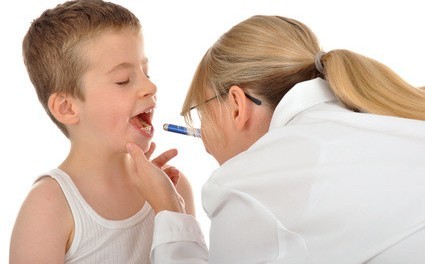Blood in Mouth and Saliva – Causes of Bleeding from the Mouth
The presence of blood in the mouth can be extremely worrying, especially if it is a sudden bleed for no obvious reason. Bleeding when coughing (hemoptysis), vomiting (hematemesis) or from the nose (epistaxis) indicates the most likely source of the bleed – the respiratory passages, gastrointestinal tract or nasal cavities respectively. Many of the causes of bleeding in these cases may also be responsible for bleeding from the mouth (stomatorrhagia).
In order to identify the most likely cause, it is important to take preceding events into consideration. Finding blood in the mouth is expected but nevertheless worrying and possibly serious after these conditions :
- after dental work
- postoperatively after surgery to the head or neck (mouth, nose, nasal sinuses, pharynx, tonsils, larynx)
- after trauma to the head and neck
However, the sign of bleeding from the mouth in a situation where none of these events have previously occurred needs to be investigated further in order to quickly and accurately identify the site of the bleed. It is also important to identify whether the blood in the mouth was related to coughing, vomiting or a nosebleed.

Causes of Blood in the Mouth
Recurrent bleeding from the mouth, extending over weeks or longer, should always raise the concern about oral cavity cancer. Malignant tumors within the nasal cavity, esophagus or larynx may also result in bleeding from the mouth.
Bleeding may not often be clearly evident as it may be swallowed along with saliva, or drain down into the esophagus. It may only be obvious upon brushing or spitting and due to the action of gravity, it may be more pronounced upon waking after sleeping or lying flat.
Blood that pools in the mouth is a serious sign, most often indicative of a rupture of an artery. It needs immediate medical attention.
Mouth
- Injury to the head (particularly to the mouth and nose).
- Stomatitis – inflammation of the mouth due to mechanical or chemical trauma.
- Bleeding dental caries (tooth cavity), gingivitis, periodontitis
- Bleeding aphthous ulcers (mouth sores)
- Infections – candida, herpes, cytomegalovirus (CMV), viral hemorrhagic fevers
- Scurvy (vitamin C deficiency)
- Heavy metals like lead, mercury or arsenic poisoning
- Cancer – mouth, nasal cavity, pharynx
- Bleeding disorders like hemophilia
- Rare syndromes like Sackey-Sakati-Aur syndrome and Gardner-Morrisson-Abbot syndrome
Nose
- Allergic rhinitis
- Post nasal drip
- Injury like nose picking, drug use (cocaine snorting), use of nasal spray (inhalants)
- Head trauma
- Dry air
- Infections – sinusitis, rhinitis, vestibulitis
- Some of the less common causes include hypertension, Wegener’s granulomatosis
Throat
Pharyngitis (inflamed throat) may be due to :
- Infections – tonsillitis (tonsillopharyngitis) or pharyngitis
- Chemical trauma – consuming corrosive substances, severe GERD (gastroesophageal reflux)
- Allergies
- Abscess (peritonsillar, parapharyngeal, retropharyngeal)
- Tumors
Esophagus
Bleeding from lower down in the gut (stomach or duodenum) is more likely to appear dark brown to black, similar to coffee grounds. It will only be passed out upon vomiting.
- Lacerations (Mallory-Weiss tear)
- Perforation
- Tumors – adenocarcinoma, squamous cell carcinoma
- Varices
- Esophagitis – reflux, infectious, erosive, eosinophilic
- Strictures
- Ulcers
- Barrett esophagus
Larynx, Trachea, Bronchi and Lungs
- Trauma
- Foreign body
- Infections – laryngitis, epiglottitis, bronchitis, pneumonia, tuberculosis
- Bronchiectasis
- Broncholithiasis
- Cancer
- Lung abscess
- Pulmonary artery rupture
- Pulmonary embolism
- Sarcoidosis
- Aortic aneurysm leaking into the pulmonary cavity
Blood in Saliva
The presence of blood in the saliva may not necessarily be an indication of bleeding from the mouth cavity (stomatorrhagia). The mouth communicates with the nose, esophagus and larynx via the throat. This could mean that any bloody saliva may be due to bleeding in the nasal cavity, respiratory or gastrointestinal tracts.
Tracing the cause may be easier if the blood in the saliva is only evident or more pronounced in one of these situations :
- After or during vomiting, regurgitating or when belching indicates bleeding from the esophagus.
- After or during coughing (hemoptysis) or sneezing indicates bleeding from the airways or lungs.
- After sneezing, blowing the nose, in post nasal drip, with nasal congestion or accompanying a bleed from the nose indicates bleeding from the nasal cavity.
If there is blood in the saliva without any clear correlation with the features mentioned above, then pathology within the mouth has to first be excluded before the neighboring cavities are investigated. In order to help with a diagnosis, it is important to identify if the bleeding is only evident in the saliva during or after one or more of the following :
- Eating or drinking
- Biting, chewing or swallowing
- Brushing, gargling with a mouth rinse or flossing
- Talking or shouting
- Breathing through the mouth
Causes of Bloody Saliva (Spit)
Persistent or recurring mouth sores and ulcers known as recurrent aphthous stomatitis are a common condition and needs to be excluded as a possible site of bleeding. These sores/ulcers may be due to one or more of the causes mentioned below or occur for no known reason (idiopathic).

Trauma
Vigorous brushing and excessive flossing are the most common causes of blood in the saliva. Other causes of trauma may include :
- After dental work/surgery or oropharyngeal surgery
- Poorly fitting dentures and other dental prosthetics
- Mouth biting
- Chemical injury to he mouth may be seen with :
- Ingesting caustic substances
- Excessive gum chewing
- Tobacco chewing
- Acidic foods
Infections
A number of bacteria, even naturally occurring bacteria, may become pathological if there are untreated wounds or sores in the mouth.
- Bacterial
- Acute necrotizing ulcerative ginigivitis (ANUG)
- Periodontitis
- Tooth cavity (decay)
- Syphilis
- Gonorrhea
Many viral and fungal infections, especially recurrent cases, are seen in immunocompromised patients (HIV, uncontrolled diabetes).
- Viral
- Varicella zoster virus (chickenpox)
- Herpes simplex virus (HSV-1)
- Epstein-Barr virus (EBV)
- Cytomegalovirus (CMV)
Bleeding from the mouth is seen with many uncommon tropical infections and hemorrhagic fevers.
- Fungal
- Candida spp (candidiasis)
- Mucorales spp (mucormycosis)
Nutritional Deficiencies
Pathology in the mouth due to nutritional deficiencies may result in lesions that could lead to bleeding in the mouth.
- Scurvy – vitamin C
- Pellagra – vitamin B3/niacin
- Iron-deficiency anemia – iron
Drugs and Toxins
Stomatorrhagia (bleeding in the mouth) is commonly seen in patients undergoing chemotherapy and/or radiation therapy. Radiation sickness may also cause mouth bleeding. Warfarin and other anticoagulants may lead to profuse bleeding due to even minor trauma in the mouth.
Other substances :
- Poisons, including venom
- Narcotics like crystal meth (long term ~ meth mouth)
Cancer
- Oral cavity cancer (primary)
- Lymphoma
- Leukemia
Blood and Bleeding Disorders
- Thrombotic thrombocytopenic purpura
- Thrombocytopenia
- Hemophilia
- Von Willebrand’s disease
References
- Bleeding in the mouth. American Cancer Society
Last updated on August 18, 2018.




